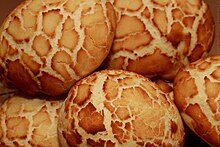Tiger bread
 Tiger bread rolls | |
| Type | Bread |
|---|---|
| Place of origin | Netherlands |
| Main ingredients | bread, Rice paste |
Tiger bread (Dutch: Tijgerbrood), also known as Dutch crunch and under various brand names, is a bread of Dutch origin that has a mottled crust.
Crust[edit]
The bread is generally made with a pattern baked onto the top made by painting rice paste onto the surface prior to baking.[1][2][3] The rice paste that imparts the bread's characteristic flavour dries and cracks during the baking process. The bread itself has a crusty exterior, but is soft inside. Typically, tiger bread is made as a white bread bloomer loaf or bread roll, but the technique can be applied to any shape of bread.
Other names[edit]
The name originated in the Netherlands, where it is known as tijgerbrood[4] or tijgerbol (tiger bun), and where it has been sold at least since the early 1970s.[citation needed] The US supermarket chain Wegmans sells it as "Marco Polo" bread.[5] In the San Francisco Bay Area it is called Dutch Crunch.[6]

In January 2012, the UK supermarket chain Sainsbury's announced that it would market the product under the name "giraffe bread", after a three-year-old girl's parents wrote to the company to suggest it.[2]
References[edit]
- ^ Stamm, Mitch (1 June 2009). "Snap, crackle, crunch bread". Modern-baking.com. Archived from the original on 14 July 2011. Retrieved 4 July 2011.
- ^ a b "Tiger bread renamed giraffe bread by Sainsbury's". BBC News. 31 January 2012. Retrieved 26 January 2023.
- ^ "Tiger Bread". BBC Good Food. Retrieved 9 August 2020.
- ^ Ayto, John (2012). The diner's dictionary : word origins of food & drink (2nd ed.). Oxford: Oxford University Press. ISBN 9780191744433.
- ^ "Marco Polo Bread - Wegmans". Archived from the original on 3 July 2018.
- ^ Kauffman, Jonathan (11 November 2010). "Dutch Crunch: According to Nick Malgieri, a San Francisco Treat". SF Weekly. Archived from the original on 28 December 2018.
